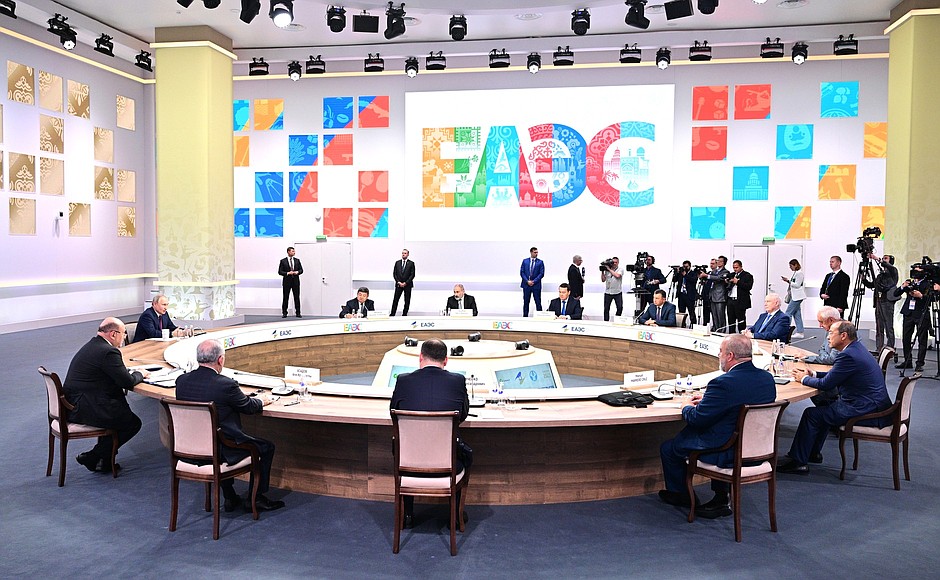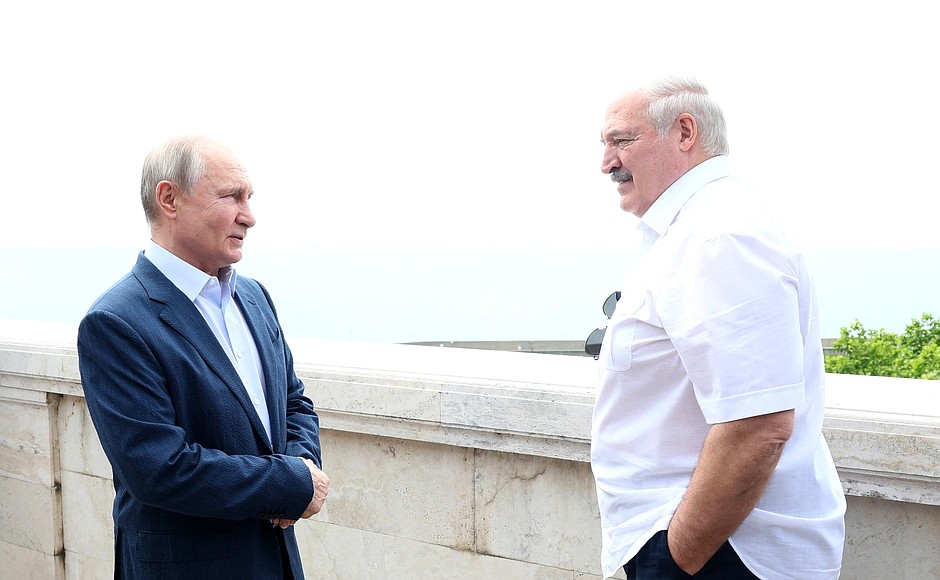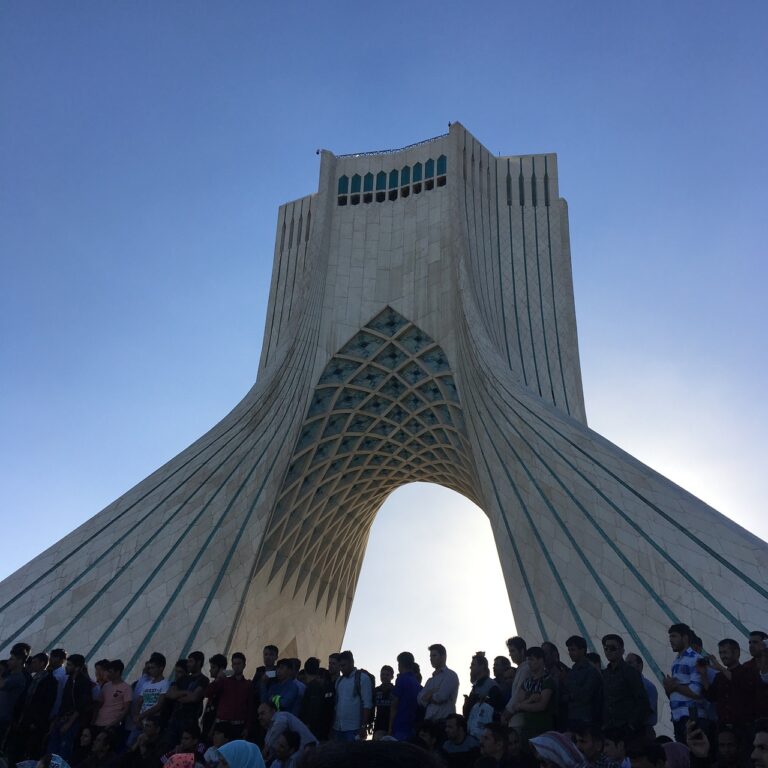
Russian President Vladimir Putin at a meeting with the heads of government of the CIS and EAEU states. Photo by Ramil Sitdikov, RIA Novosti (Courtesy kremlin.ru)
Russian President Vladimir Putin is busy strategising ways with Eurasian support to negate the impact of sanctions on Russia. He is also busy identifying friends and allies and working hard for making other national currencies acceptable in international trade to counter the American dollar.
Little surprise, therefore, that while reeling under sanctions that adversely impact its foreign trade and domestic industry, Russia today called for creating new joint ventures among the Eurasian Economic Union (EAEU) and the Commonwealth of Independent States (CIS), including under a proposed common trademark, ‘Made in the EAEU’ or ‘Made in the CIS’.
The idea was actually mooted by the President of Belarus Alexander Lukashenko at the plenary session of the Eurasian Economic Forum in Moscow on May 24, 2023, who said: “Industrial cooperation will help us manufacture products under Eurasian brands with maximum localisation and coordinate new import substitution projects. Over 25 per cent of annual industrial imports to the EAEU worth approximately $70 billion can be replaced with locally produced goods. This is ambitious work, which we will hopefully implement.”

Today, stressing the need to increase industrial cooperation more vigorously among themselves, Russian President Vladimir Putin told the heads of government of the CIS and EAEU states in Sochi (Russia) that it was important that such a brand – or both – become recognisable and popular with consumers in each of our countries. The meeting was attended by the Prime Minister of the Russian Federation, Chairman of the Eurasian Intergovernmental Council Mikhail Mishustin, Prime Minister of the Kyrgyz Republic, Chief of Staff of the Presidential Executive Office and Chairman of the CIS Council of Heads of Government Akylbek Japarov, Prime Minister of Azerbaijan Ali Hidayat oglu Asadov, Prime Minister of Armenia Nikol Pashinyan, Prime Minister of Belarus Roman Golovchenko, Prime Minister of Kazakhstan Alikhan Smailov, Prime Minister of Cuba Manuel Marrero Cruz, Prime Minister of Tajikistan Kohir Rasulzoda, Prime Minister of Uzbekistan Abdulla Aripov, as well as Secretary General of the Commonwealth of Independent States Sergei Lebedev and Chairman of the Board of the Eurasian Economic Commission Mikhail Myasnikovich.
“Particular attention should be paid to strengthening technological sovereignty in the backbone sectors of the economy and achieving genuine technological self-sufficiency so that our countries do not depend on foreign technologies or companies in critical industries,” Putin told them.
But can Putin’s call for a ‘Made in CIS/EAEU’ trademark help him overcome the impact of sanctions and export control imposed on Russia by the United States of America and its allies and the European Union following the Russian aggression in Ukraine?
This does sound like a good ploy because, despite the challenging international situation, the EAEU has continued to evolve in recent times. In general, trade in the EAEU grew by 14 per cent, to $83.3 billion in 2022. According to the Eurasian Development Bank’s estimates, mutual foreign direct investment exceeded $26 billion in mid-2022. Moreover, despite considerable geopolitical risks and uncertainties, the total GDP of the Eurasian Union member states in 2022 decreased by only 1.6 per cent.
“Some countries have shown an increase by orders of magnitude, which even got the attention of certain authorities in the United States and the European Commission. Investment has been expanding dynamically as well,” President of the Russian Union of Industrialists and Entrepreneurs (RSPP) Alexander Shokhin, said at the May 24, 2023, Eurasian Economic Forum meeting.
Even as Putin has thus far put up a brave front claiming the Russian economy to be improving, the US recently claimed that Russia’s foreign reserves and profits from its state-owned enterprises are down by more than half and more than 1,700 foreign companies have reduced, suspended, or ended operations in Russia since the onset of the invasion. “That’s tens of thousands of jobs gone, a massive flight of foreign expertise, and billions of dollars in lost revenue for the Kremlin,” the US Secretary of State, Antony J Blinken, recently claimed.
At a meeting on economic issues in Moscow on April 11, 2023, Putin though referred to predictions that the GDP growth in Russia may be closer to 2 per cent, “and that says a lot”. But he did concede that the external risk factors for the Russian economy had not gone away – “It is no secret that our Western opponents are trying to compel many of our partners to curtail beneficial cooperation with Russia through persuasion and with various promises and blackmail.” He acknowledged that the situation remains difficult in the automotive industry and the timber processing industry, as well as in the production of chemical products and fertilisers. “It is important to constantly monitor the effectiveness of our support for industry and the industrial sectors, small and medium-sized companies, to identify problem areas in time and to promptly resolve emerging business-related difficulties, and to lend a hand to enterprises and labour teams,” he said then.
Immediately after Putin’s stress on creating a common ‘Made in CIS/EAEU’ brand, Russian Prime Minister Mikhail Mishustin, who is also Chairman of the Eurasian Intergovernmental Council, said the Council was preparing the regulatory framework to launch a “very important project – subsidising the union’s programmes. We expect that the first ones will receive support as early as the beginning of next year. That is, we will be able to further promote EAEU-made high-quality products, advanced solutions and technologies”.
However, the common brand is just one of the strategies to negate American sanctions on Russia. Putin seeks to ensure digital independence and says CIS and EAEU must continue to work vigorously on building a single digital ecosystem comprised of national systems for online public services and e-governments.
Next on his bucket list is to ensure that the CIS and EAEU step up their activity via the executive authorities and the central banks of their countries to strengthen their financial sovereignty. “This will help us to ensure the stability of credit and banking as well as the settlement infrastructure and to diversify and harmonise the Eurasian financial market so as to create favourable conditions for preserving capital and investing it in our economies,” he said.
The Russian President, at the same time, also spelt it out loud and clear that Russia was not going to isolate itself from the global economy, “especially not from its most promising development centres”.
Putin has been identifying friendly markets and promoting international business in local currencies which Russia is already doing with friendly countries. He pointed out at the plenary session of the Eurasian Economic Forum on May 24, 2023, that many fast-developing economies, including China, India, and Latin American countries, are switching to national currencies in their foreign trade settlements. “It is important to coordinate our efforts to create a new and decentralised global financial system. Of course, the stability of global finance will largely depend on how this decentralisation goes. The more decentralised the system, the better it will be for the global economy since it will be less dependent on crises in the countries that still enjoy an advantage in the form of world reserve currencies. This will boost the security of not only transaction settlements, but the entire global economy as well, and will remove politics from the economic sphere,” he said.
Russia today apparently banks heavily on support from major international associations, such as BRICS, the Shanghai Cooperation Organisation, the Association of Southeast Asian Nations, the Cooperation Council for the Arab States of the Gulf, as well as multilateral organisations in Latin America and Africa. Putin said he is also banking on the efforts of the Eurasian Union in expanding “friendly ties with other countries in the near abroad, Asia, India, the Middle East, Africa and Latin America, which represent the absolute majority of the world’s population and drive global growth. Today, these global economic growth drivers represent key investment attraction points and new transport route hubs”.
Moreover, as Mishustin today pointed out, the EAEU has carried out serious work on drafting a free trade agreement with Iran and expects to sign it before the end of the year. “We are stepping up our talks with Egypt, Indonesia and the United Arab Emirates,” he said.
With no immediate end in sight to the Russian aggression in Ukraine, Putin does have a task in hand to avert an economic crisis in Russia. But to what extent his strategies will work is to be seen now.


 By
By 


